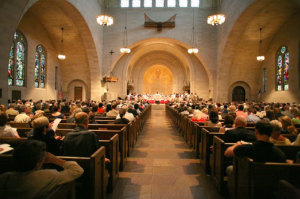Max Lucado: Jesus Prayed for Unity, So Should We

On the last night of his life Jesus prayed a prayer that stands as a citadel for all Christians:
"I pray for these followers, but I am also praying for all those who will believe in me because of their teaching. Father, I pray that they can be one. As you are in me and I am in you, I pray that they can also be one in us. Then the world will believe that you sent me" (John 17:20–21 NCV).
How precious are these words. Jesus, knowing the end is near, prays one final time for his followers. Striking, isn't it, that he prayed not for their success, their safety, or their happiness.
He prayed for their unity. He prayed that they would love each other. As he prayed for them, he also prayed for "those who will believe because of their teaching." That means us! In his last prayer Jesus prayed that you and I be one.
Of all the lessons we can draw from this verse, don't miss the most important: unity matters to God. Why? Because "all people will know that you are my followers if you love each other" (John 13:35 NCV). Unity creates belief. How will the world believe that Jesus was sent by God? Not if we agree with each other. Not if we solve every controversy. Not if we are unanimous on each vote. Not if we never make a doctrinal error. But if we love one another.
Unity creates belief. Disunity fosters disbelief. Who wants to board a ship of bickering sailors? Paul Billheimer may very well be right when he says: "The continuous and widespread fragmentation of the Church has been the scandal of the ages. It has been Satan's master strategy. The sin of disunity probably has caused more souls to be lost than all other sins combined."
Could it be that unity is the key to reaching the world for Christ? The world will be won for Christ when the church is one in Christ. If unity is the key to evangelism, shouldn't it have precedence in our prayers? Shouldn't we, as Paul said, "make every effort to keep the unity of the Spirit through the bond of peace" (Ephesians 4:3 NIV)?
Nowhere, by the way, are we told to build unity. We are told simply to keep unity. From God's perspective there is but "one flock and one shepherd" (John 10:16). Unity does not need to be created; it simply needs to be protected.
Where there is faith, repentance, and a new birth, there is a Christian. When I meet a person whose faith is in the cross and whose eyes are on the Savior, I meet a brother or a sister. Wasn't that Paul's approach? When he wrote the church in Corinth, he addressed a body of Christians guilty of every sin from abusing the Lord's Supper to arguing over the Holy Spirit. But how does he address them? "I beg you, brothers and sisters" (1 Corinthians 1:10 NCV).
When the church in Rome was debating whether to eat meat offered to idols, did Paul tell them to start two churches? One for the meat-eaters and one for the non-meat-eaters? No, on the contrary, he urged, "Christ accepted you, so you should accept each other, which will bring glory to God" (Romans 15:7 NCV).
Is God asking us to do anything more than what he has already done? Hasn't he gone a long way in accepting us? If God can tolerate my mistakes, can't I tolerate the mistakes of others? If God allows me, with my foibles and failures, to call him Father, shouldn't I extend the same grace to others? If God doesn't demand perfection, should I?
"They are God's servants," Paul reminds us, "not yours. They are responsible to him, not to you. Let him tell them whether they are right or wrong. And God is able to make them do as they should" (Romans 14:4 TLB).
God's ship is a grand vessel. Just as a ship has many rooms, so God's kingdom has room for many opinions. But just as a ship has one deck, God's kingdom has a common ground: the all-sufficient sacrifice of Jesus Christ.
Will you pray with me for the day when Jesus' prayer is answered?





























